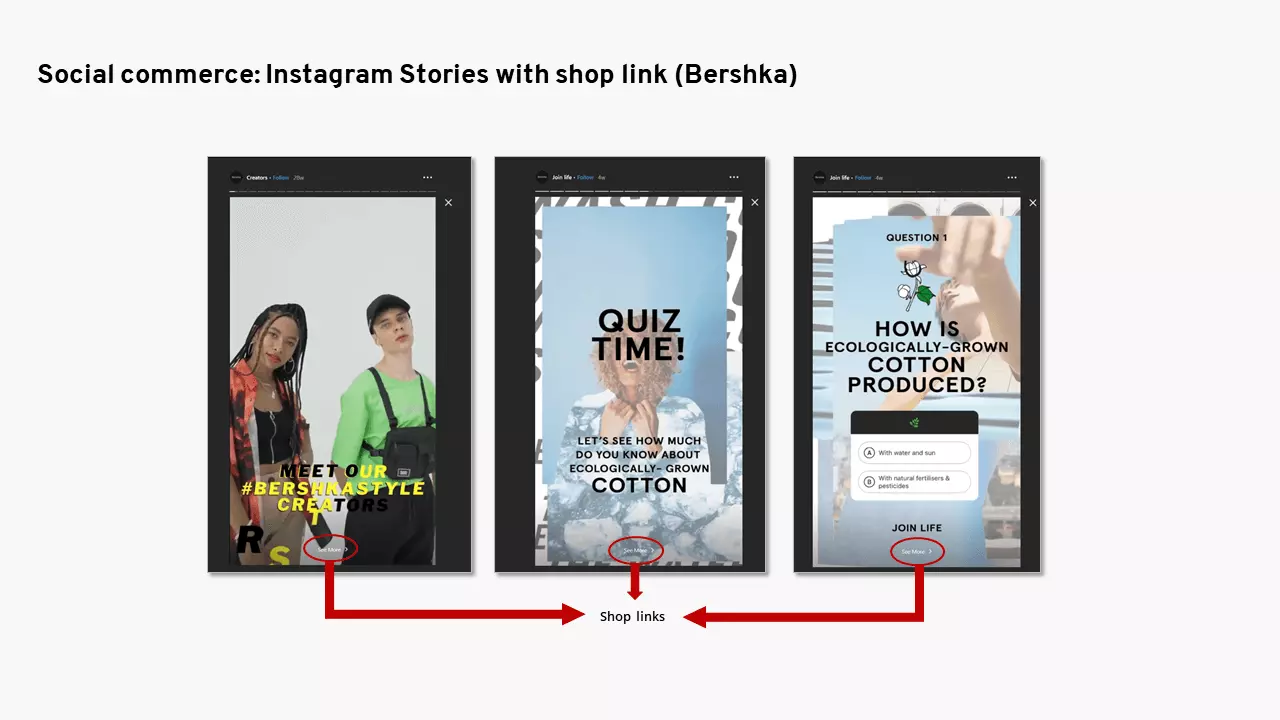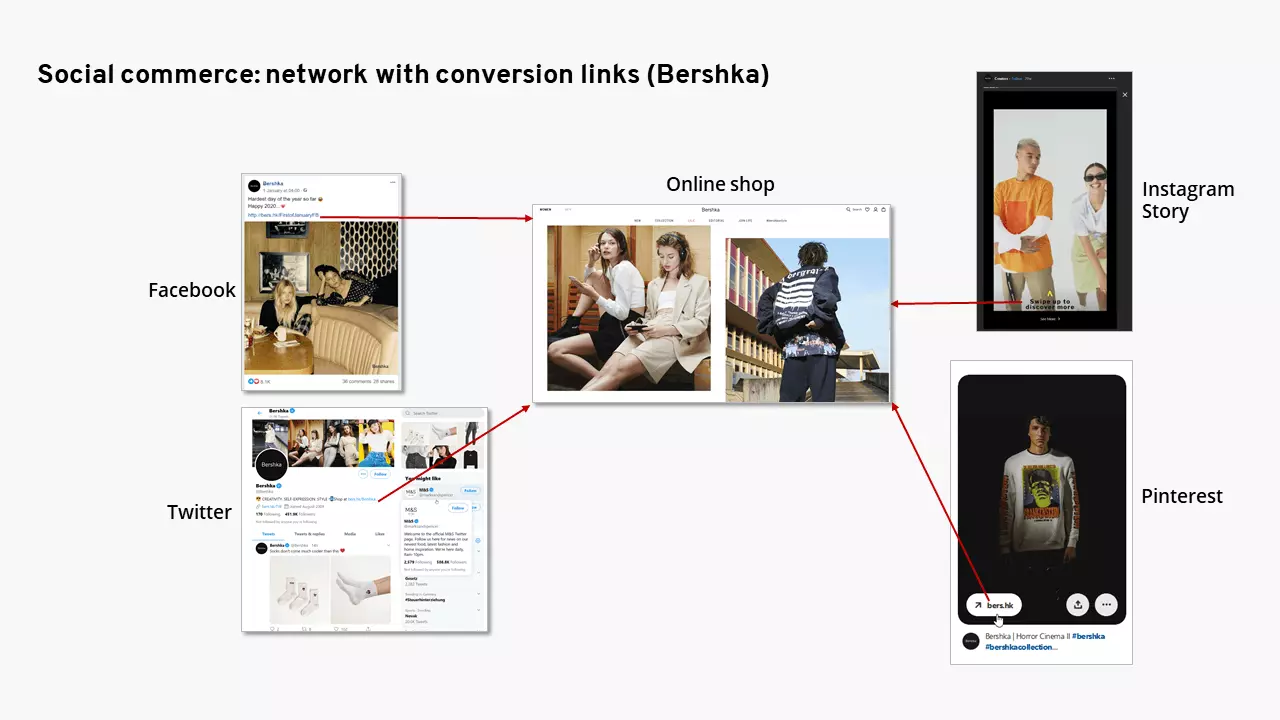Social commerce – using social media to increase sales
Since the beginning of the 2000s, the popularity of social commerce has rocketed. At first, only a few companies used social networks for customer engagement and product advertising. Today, social media is a hugely popular platform among both customers and brands. Facebook, Instagram, YouTube and others enable smaller and medium-sized businesses to directly sell their products to consumers.
What is social commerce?
The term “social commerce” was coined by technology blogger Steve Rubel and venture capitalist David Beisel back in 2005/2006. It refers to digital commerce that has a social component. With social commerce, companies can attract potential customers on social media platforms. The basic definition of social commerce is a form of modern recommendation marketing. As Beisel said:
“What better way to advertise a product than to have a friend recommend it to you?”
David Beisel, Source: https://genuinevc.com/2005/12/06/the-beginnings-of-social-commerce/
The following aspects play an important role in social selling:
- Active participation of the customer (for example, through comments, likes, shares, etc.)
- Direct integration of the customer in the design and development of products
- A personal connection and good communication among customers – word of mouth via the internet, messengers, or apps is particularly important, as it helps brands boost sales and customer engagement through offers or competitions
- Personal and emotional long-term connection between the customer and the brand
Social commerce harnesses these factors to advertise products or a brand. By tying a product to a target audience, entire communities can be built and fostered by a single brand. At the same time, social commerce is all about sharing product and brand information with customers. Businesses can even recruit brand ambassadors for events and campaigns. With social media usage on the rise, customer conversion has become an important task for retailers. But how can you turn a targeted (and interested) individual into a potential customer? Brands that succeed in turning a target audience into customers are said to have high conversion rates.
As social media became increasingly differentiated, marketing methods evolved. With the success of Instagram, for example, the connection between creators and fans has moved into the foreground. That’s where influencers come in. Influencers and creators are often treated like idols across popular social media apps. This has created an entirely new arm within marketing – influencer marketing – which utilises the endorsement of branded or sponsored products by influencers. It’s a more organic way of achieving conversions than adverts, which may be disruptive.
These strategies are useful because they boost the acceptance of sponsored posts and intensify the connection between the customer and a product. Customer willingness to engage with a product and their desire to own it increase. The emotional involvement and direct link to a product (for example, via a web shop link) make the purchasing experience much more efficient.
But trust remains the most important factor in turning potential customers into buyers. By using social media, brands can establish a more personal connection with their customer base.
Social proof is another important aspect of social commerce. Customers tend to trust popular opinion: if other users in a community purchased and liked a product, it cannot be a bad product. That makes product likes, comments and positive customer reviews all the more important as part of a successful social commerce strategy. If a product has positive reviews, other customers are more easily convinced to purchase it. This psychological and social phenomenon is particularly evident on Amazon: products with few or predominantly negative reviews rank lower in search results and are rarely bought. Sellers with positive reviews tend to make more sales.
Selling on social media – what are the options and techniques?
Small and medium-sized businesses can choose from a wide range of social networks for advertising and selling their products. The most important platforms for social shopping include Facebook (founded in 2004), Twitter (founded in 2006), Instagram (founded in 2010), and Pinterest (founded in 2010).
Social commerce on Facebook
It’s easy to sell your products and services on Facebook. A business or fan page with images, graphics, videos and text is usually enough to get you started. Facebook even rolled out a “shop now” call-to-action button so customers can check out straight away. But there are also plenty of specialist e-commerce tools brands can choose from such as dynamic ads. Dynamic banner ads are a great tool to automatically adapt ad content and campaigns to specific target audiences. With over 2.4 billion monthly active users globally, the potential reach of these marketing tools is enormous. Activities relating specifically to selling on Facebook are also referred to as f-commerce.
- Sell on social media in minutes
- Manage everything from one platform
- Works with any product or service
Social commerce on Instagram
According to its own data, the photo and video sharing app Instagram now has over 1 billion users worldwide. The app has evolved to include extended storytelling capabilities using Instagram Stories, and it is even possible to live-stream events. The most popular advertising tools on Instagram include shopping ads, Stories ads, video ads, and swipeable carousel ads. Instagram is well-known for its influencer marketing which predominantly engages younger people – 60% of its users are aged 18 to 24 years.
Lifestyle brands (e.g. those in entertainment, fashion, beauty, design, and food) are particularly fond of using the app to promote their products. According to Adobe research, Instagram now drives 10.7 percent of social referral to retail sites. Another study found that brands were able to boost their traffic by 1,416% using shoppable posts on Instagram.
Learn more about "Live streaming shopping: the future of e-commerce?" in our Digital Guide article on the topic.
Social commerce on Pinterest
As of 2019, Pinterest, the online pin board for graphics and photos, had over 300 million users globally. Pinterest is a great platform for people actively looking for product and shopping inspiration. Given its focus on hobbies and DIY, it’s hardly surprising that lifestyle and fashion are among its main categories. Brands can now easily link their images (called Pins) to their web shop. And in 2019, Pinterest officially unveiled Pinterest Ads across multiple countries. Marketing and sales on Pinterest have since benefitted from the use of carousel and video pins. As part of a social media marketing strategy, Pinterest is primarily used to drive traffic to a website because ads can be connected to an online shop. Women are the key target group on the platform, but the number of male users is growing.
- Sell on social media in minutes
- Manage everything from one platform
- Works with any product or service
Social commerce on Twitter
The micro-blogging platform Twitter now has more than 330 million monthly active users. Its USP is that it’s always up to date. Twitter has great potential for retailers and brands whose audiences actively use the platform, including media, local services and service providers. Many user profiles feature links to online shops. Businesses can also embed campaign and product videos. But not all companies use Twitter for commerce. Lots of businesses use it to boost their image, connect with marketers and customers, and promote their brand and products using tweets and hashtags.
The six pillars of social commerce
A dedicated strategy is essential for success in social commerce. Retailers need to establish a loyal community that regularly visits their social media profiles and clicks on calls-to-action. Here are the six key pillars of social commerce to focus on:
- Relevant content: Companies should provide content that their customers are interested in. Content should be high quality, visually engaging, and tailored to your target audience(s). Aim to provide added value to customers with your social commerce content, e.g. by offering advice, tips and tricks. When it comes to cross-channel and multi-channel concepts, content should be created to suit the chosen platform. However, it also needs to work in synergy with posts across other channels.
- Community: The basis of social commerce is the community that you want to establish a long-term relationship with. Businesses should nurture their audiences and harness the fact that customers talk to one another on social media. A great way to engage your audience is by speaking to individual customers. This may sound time-consuming but it tends to pay off. Events and special activities provide further opportunities for bonding with customers. In addition, brands and retailers should always be easy to reach, whether a customer is demanding a return or has product questions.
- Communication: By encouraging communication and activities in a community, businesses get to know their customers and are able to optimise their products accordingly. Likes are an excellent way to measure preferences and target them subsequently. You can even use social commerce to actively include customers in product development, ensuring that products are improved.
- Creating and strengthening connections: Businesses should strengthen customer engagement through dedicated activities. In other words, it’s helpful to become an active player on social media and create a firm foundation for social commerce. The basis of a multi-channel concept can occur on three levels: professional (Xing, LinkedIn), social (Facebook, Instagram), and informational (Twitter).
- Context through data: The success of a social commerce strategy can be assessed through data. This helps to put results into context and uncover customer habits. Defining the audience you want to reach is referred to as targeting. Data on potential customers’ search and shopping behaviours and their social media usage can help brands target them. With mobile end devices, brands can now track a customer’s geographical location – also referred to as geo-targeting. One of the big advantages of social commerce’s data focus is that in contrast to classic advertising (TV, print), a company can target customers who are more likely to purchase their products. In the long term, this saves businesses money. But customer needs should be at the heart of any data-based approach.
- Innovative commerce through digitalisation: Social commerce forms part of an internet-based sales strategy and can make a vast range of products and services available. Customers are no longer restricted to shop opening times. Similarly, brands can send emails and post on social media at the weekend. The rise of social commerce has increased flexibility across many sectors, including business-to-business (B2B) and business-to-consumer (B2C) communication. Amazon is a great example because the e-commerce group regularly expands access to its product portfolio using digital tools (e.g. voice assistant Alexa), going far beyond traditional retail approaches.
10 recommendations for a successful social commerce strategy
Here are our top tips for creating a successful and sustainable social commerce strategy:
- Explore the needs and desires of your target audience(s) and cater for them.
- Engage with social media and find out which platforms suit your brands and/or products the best; match your brand’s goals to the right social media channel.
- When developing a social commerce concept, consider cross-channel strategies.
- Nurture the dialogue with your customers and potential customers, and pay attention to the communication methods you use.
- Communicate with your customers regularly and authentically. Be transparent.
- Invest in the quality and added value of your content.
- Aim for conversion, but not by any means necessary. Maintain a balance between “social” and “commerce”.
- Make a long-term plan for your efforts and investments (e.g. channel and community maintenance, content development, planning of multi-channel campaigns, etc.).
- Prepare a de-escalation strategy to address communication or customer service issues. Be prepared for criticism of your products or your entire company/brand.
- Pursue a data-based evaluation of your social media success by studying your customers’ shopping and community behaviours. Use the results to optimise your brand’s engagement on social channels and develop audience-centred products and services.
- Sell on social media in minutes
- Manage everything from one platform
- Works with any product or service







